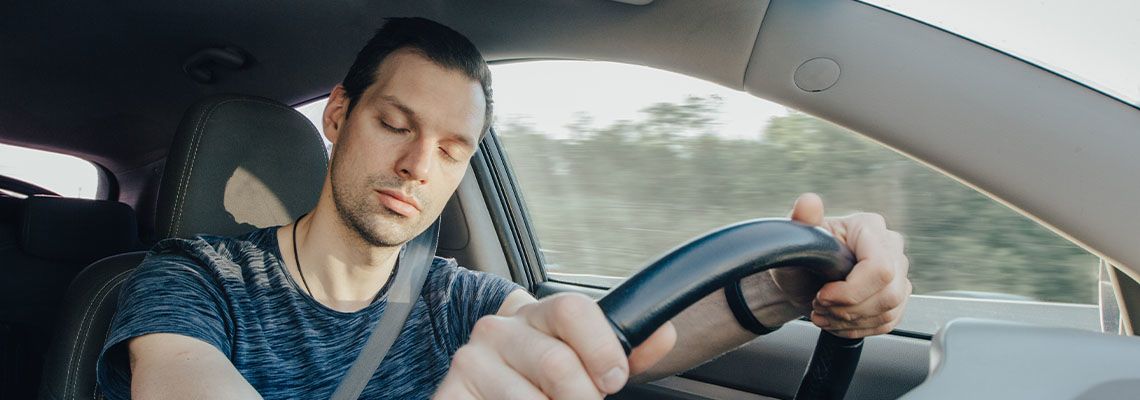Legal Liability for Falling Asleep at the Wheel

You've likely heard about the dangers of driving under the influence. But did you know that driving while drowsy can be just as dangerous? After being awake for 20 hours, drowsy drivers experience impairment comparable to having a blood alcohol content of 0.08%, which is the current BAC legal limit in most states.
Drowsy driving causes tens of thousands of accidents each year. And when it happens, it raises significant questions about legal liability and how to hold the responsible parties accountable.
However, proving fault in court in such cases can pose quite a challenge. Concrete evidence that a driver was asleep during the incident is not always easy to come by. In some states, statutes even necessitate proof that the driver had been awake for an uninterrupted 24 hours before the accident. This can be tricky to establish, and supporting the claim often requires eyewitness testimonies.
How the Car Accident Claim Process Works in Kentucky
Kentucky is a "no-fault" state when it comes to car insurance and accident claims. This means that after an accident, drivers turn to their own insurance company for compensation for medical expenses and other out-of-pocket losses, regardless of who was at fault.
However, it's important to note that this no-fault rule only applies to personal injury claims; it doesn't prevent a driver from being held liable for property damage. In other words, if someone fell asleep at the wheel and caused damage to your vehicle or property, they can still be held liable for those damages. To seek compensation for property damage, you can file a third-party car insurance claim through the drowsy driver's car insurer, or a small claims court lawsuit.
The Role of Evidence in Determining Liability for Falling Asleep
If you've been injured in an accident when someone fell asleep at the wheel, you may be wondering how to prove their negligence. Although it may appear straightforward (considering they are the one who dozed off), establishing legal liability for dozing off can be tricky.
That's why evidence is a crucial factor in determining liability in these cases. Circumstantial evidence can help establish that the driver was not fully conscious at the time of the accident. For instance, if a car suddenly veers out of its lane or enters a crowded intersection without leaving any skid marks, it could suggest the driver didn't attempt to brake, thereby hinting at their unconscious state. Cell phone records might also provide geographic data indicating the driver had been covering substantial distances just before the accident.
In certain cases, the driver might have been under the influence of medication known to cause drowsiness. If they have a prescription for such medication, you could argue that this contributed to them falling asleep at the wheel. Additionally, medical reports could be used as evidence, highlighting any medical issues or conditions that may have contributed to the driver's drowsiness.
However, the standard of liability may vary based on whether it’s a civil or criminal case.
Understanding Criminal vs. Civil Cases
A driver who falls asleep at the wheel could potentially face criminal charges of reckless driving or even negligent homicide if their accident results in a fatality. In these cases, prosecutors need to prove aspects like "serious blameworthiness" or "dangerous speeding" beyond a reasonable doubt to secure a conviction for negligent homicide related to drowsy driving.
In a civil case, the burden of proof falls on the plaintiff, who must establish negligence by a "preponderance of the evidence." This essentially means that it is more likely than not that the defendant was negligent. While the burden of proof is lower compared to criminal cases, car accident cases can still be intricate and require careful analysis of the facts and circumstances involved.
Falling asleep at the wheel can have serious consequences not just for the driver but also for others on the road. It is important to understand the legal liability and processes involved in such cases. If you or a loved one has been involved in an accident due to drowsy driving, it's crucial to consult with an experienced attorney—one who can guide you toward a just outcome.
Enlist Capable Legal Support After an Accident
If you've been involved in an accident because another driver fell asleep at the wheel, it'll be beneficial to seek assistance from experienced personal injury attorneys, such as Mr. and Mrs. Slechter of the Slechter Law Firm, PLLC. They have extensive experience serving clients throughout Kentucky.
Falling asleep at the wheel is a serious issue with severe legal consequences. Understanding the law surrounding this topic can be overwhelming, especially if you're dealing with the aftermath of an accident. It's in these situations that professional legal advice from seasoned lawyers like Mr. and Mrs. Slechter can prove to be invaluable. Contact them today at their Louisville firm to learn how they can help.

